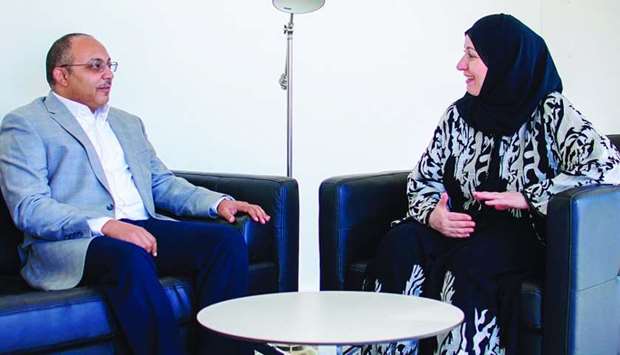Presenting at the National Air Quality Conference in Austin, US, Hamad Bin Khalifa University’s Qatar Environment and Energy Research Institute (Qeeri) scientist, Dr Mohamed Ayoub, showcased institutional efforts to deliver high-impact, research-based solutions aimed at positively impacting air quality in Qatar.
Organised by the United States Environmental Protection Agency, the conference brought together leading local and international air quality researchers to discuss forecasting, mapping and innovative outreach programs.
Dr Ayoub, lead, Qeeri’s Air Quality and Climate Change Portfolio and Dr Fatima al-toum, a health inspection expert at the Ministry of Public Health, co-presented at the conference, jointly representing Qatar in this initiative.
During their presentation, the scientists spoke about how Qeeri enables the development and evaluation of national policies, strategies and technologies to mitigate the impact of poor air quality in Qatar. They also elaborated on how the institute contributes to adapting to climate change. Dr Ayoub said, “It is important for us to be able to highlight the positive steps taken to tackle and mitigate air quality concerns in Qatar. A conference like this also allows us to share knowledge and information about the latest developments with colleagues in the field, and opens doors to future collaborations.”
Some of the topics covered included the six-point Air Quality Management Framework developed by Qeeri, how air quality is monitored in Qatar, an air quality decision support system and upcoming air quality forecasting capabilities.
Dr al-Otoum said, “In order for our work to have a real impact, collaboration is key. We, at the Ministry of Public Health, work closely with Qeeri to develop an innovative and efficient air quality management system. We also partner with other national stakeholders, both in government and the private sector as well as research and academia to ensure we can successfully implement the proposed solutions to protect the public health from a wide spectrum of adverse health outcomes due to possible exposure to outdoor air pollution.”
The three-day conference – which saw the attendance of state, local, regional and international planning agencies, environmental and research organizations, and industry – featured an opening plenary session, exhibits and a poster session. There were also focused breakout sessions on air quality forecasting and mapping, and communicating air quality. The organising committee selected presentations from submissions based on the quality of research, its impact and technical merit.
Other contributors to this effort include Dr Luis Ackerman, Dr Christos Fountoukis, and Dr Rima Isaifan from Qeeri, and Jassim Al Emadi from the Ministry of Municipality and Environment.

